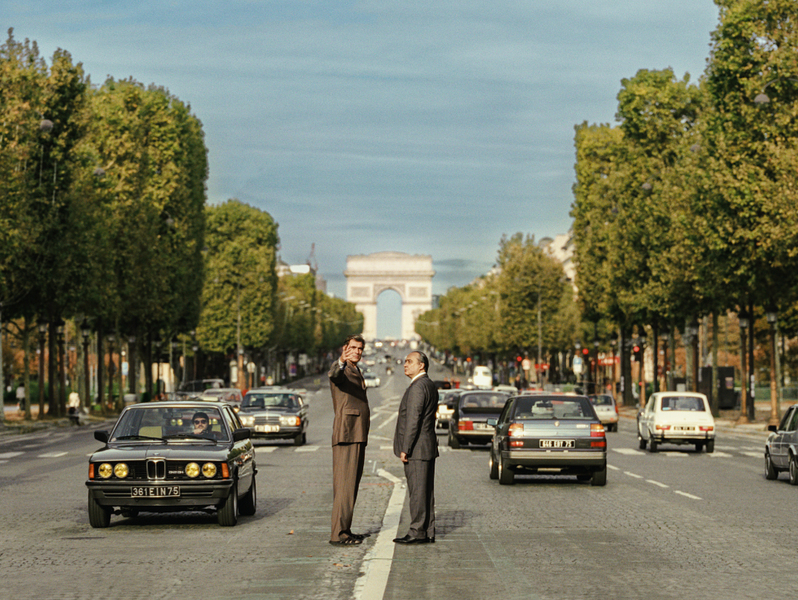
A Structure Built, a Voice Lost
The Great Arch (L'inconnu de la Grande Arche)
MOVIE REVIEW
The Great Arch (L'inconnu de la Grande Arche)
-
Genre: Drama
Year Released: 2025
Runtime: 1h 44m
Director(s): Stéphane Demoustier
Writer(s): Laurence Cossé, Stéphane Demoustier
Cast: Claes Bang, Sidse Babett Knudsen, Swann Arlaud, Michel Fau, Xavier Dolan, Alessandro Bressanello, Viilbjørk Malling Agger, Pierre-François Grunewald
Languages: French, English, and Danish with English subtitles
Where to Watch: shown at the 2025 Cannes Film Festival
RAVING REVIEW: When a competition built on anonymity unexpectedly hands a colossal national project to a soft-spoken Danish academic, the result is less a fairy tale and more a slow-motion clash between idealism and the real world. THE GREAT ARCH taps into that tension with precision, offering a procedural character study about the weight of vision, the limits of control, and how quickly inspiration can become compromised under public scrutiny.
It all began in 1982, when France’s newly elected president launched an ambitious plan to erect a modern-day monument. Designed to echo the alignment of Paris’s historical landmarks while moving away from symbols of military pride, this project wasn’t reserved for the elite. In a bold move, the competition was open, global, and anonymous. Submissions flooded in, but the winning blueprint came from an unexpected source: Otto von Spreckelsen, a 53-year-old architecture professor whose entire portfolio consisted of chapels and a private residence.
From the moment Otto steps into the public arena, the film clarifies that this won’t be a celebratory rise. THE GREAT ARCH builds its drama not through theatrical arguments or grand speeches, but through quiet meetings, incremental changes, and mounting tension. Otto’s immaculate design—a hollow cube meant to represent openness—may have won the jury’s hearts, but executing it requires navigating a deeply political landscape. Unfortunately for him, his strengths don’t lie in strategy. He wants the work to speak for itself, and in a setting dominated by negotiation, that becomes a problem.
The film’s central strength lies in its approach to conflict. Power struggles unfold not through villains but through conflicting interests. No matter how minor, every alteration to the structure feels like a veiled attempt to redefine the architect’s intent. The focus on process—who signs off on what and why—becomes the film's heart. As Otto’s concept starts bending under pressure, the bigger question emerges: Can a public work of art remain the creator’s once it enters the system?
Otto is compelling because the film refuses to turn him into a tragic hero or a misunderstood genius. He’s meticulous, deeply principled, but also inflexible. That unwillingness to adapt doesn’t earn him many allies, and the more he resists change, the more the project slips from his grasp. The film doesn’t frame this as a moral failing or martyrdom—it simply lets the situation unfold, letting viewers decide whether Otto’s resolve is noble or naïve.
The film captures—often with quiet precision—the hollowing out of authorship. It shows how ideas can survive physically when filtered through state bureaucracy, while dying philosophically. Otto’s design is absorbed, reshaped, and molded into something still recognizable but stripped of its essence. The pain here isn’t failure—it’s partial “success.”
The climax is more about realization than confrontation. It’s in Otto’s eyes, posture, and silence—the moment he understands that he’s lost control without ever being told so. That kind of emotional storytelling, when done right, lingers. Could the film have benefited from more texture, a glimpse deeper into Otto’s life? Maybe. But doing so might have diluted the strength of its framing. The film keeps its themes tightly bound by refusing to humanize him in familiar ways. Otto becomes less of a man and more of a concept: the architect whose work defined him, and whose loss of it undid him.
By the end, we’re not watching the birth of a monument—we’re witnessing a slow detachment from authorship. The building may rise, but the vision has been so compromised and revised that what stands no longer belongs to the person who imagined it. And that’s the real tragedy here—not dramatic collapse, but subtle erosion.
THE GREAT ARCH delivers a calm but cutting examination of what it means to create something in the public eye. It asks difficult questions about credit, compromise, and control without easy answers. It is a slow burn with something to say, especially to anyone who’s ever tried to build something and watched it become someone else’s.
Please visit https://linktr.ee/overlyhonestr for more reviews.
You can follow me on Letterboxd, Instagram, Twitter, and YouTube. My social media accounts can also be found on most platforms by searching for 'Overly Honest Reviews'.
I’m always happy to hear from my readers; please don't hesitate to say hello or send me any questions about movies.
[photo courtesy of LE PACTE, EX NIHILO PRODUCTION, ZENTROPA ENTERTAINMENTS]
DISCLAIMER:
At Overly Honest Movie Reviews, we value honesty and transparency. Occasionally, we receive complimentary items for review, including DVDs, Blu-rays, CDs, Vinyl Records, Books, and more. We assure you that these arrangements do not influence our reviews, as we are committed to providing unbiased and sincere evaluations. We aim to help you make informed entertainment choices regardless of our relationship with distributors or producers.
Amazon Affiliate Links:
Additionally, this site contains Amazon affiliate links. If you purchase through these links, we may receive a commission. This affiliate arrangement does not affect our commitment to honest reviews and helps support our site. We appreciate your trust and support in navigating these links.